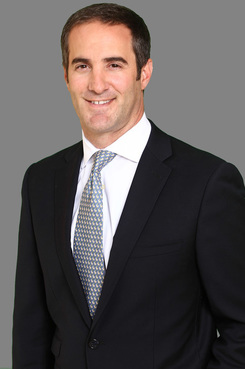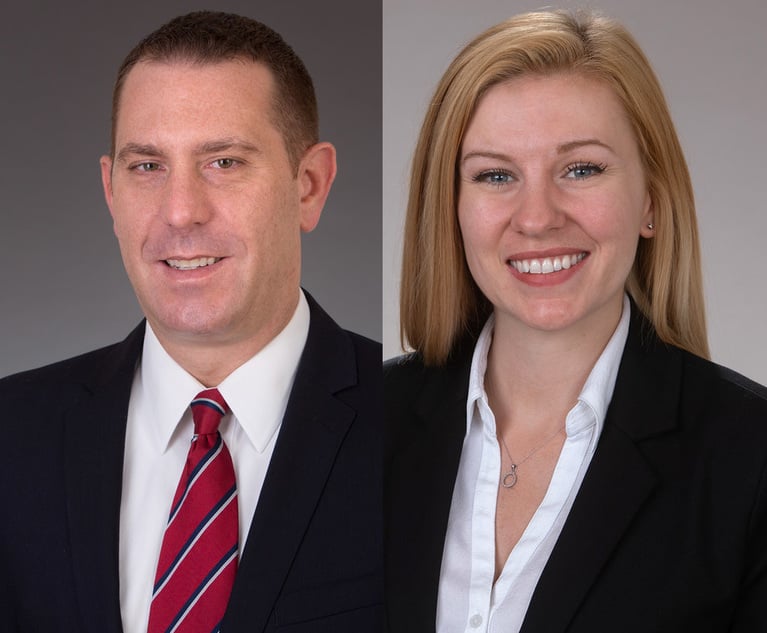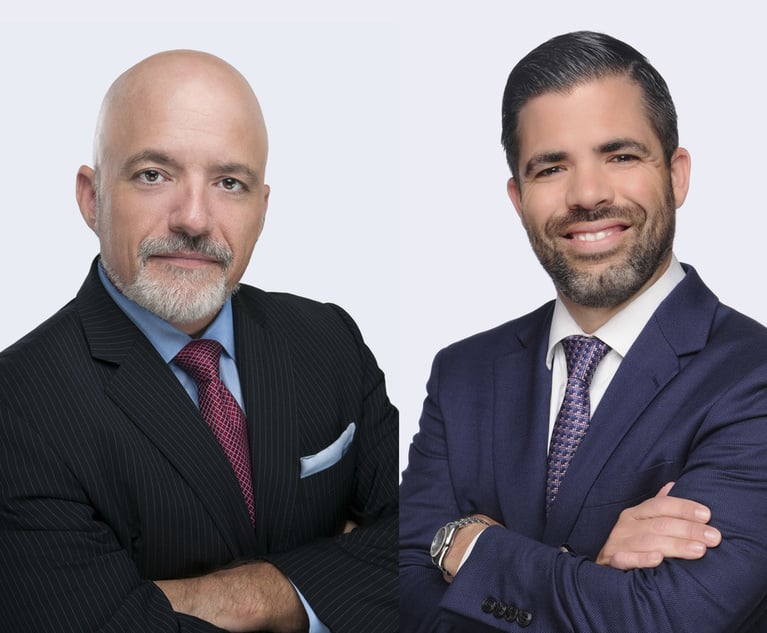Going Solo: Six Financial Tips for Setting Up Your Own Law Firm
Many associates in large law firms dream of the day when they can go out on their own. However, without a clear understanding of the financial and operational realities involved in running a law practice, the transition from lawyer to small business owner can become a challenging one.
April 05, 2018 at 10:00 AM
5 minute read

Many associates in large law firms dream of the day when they can go out on their own. However, without a clear understanding of the financial and operational realities involved in running a law practice, the transition from lawyer to small business owner can become a challenging one.
Not only can the road to success be rocky, it tends to take much longer than most people anticipate. Below are six business and financial tips an aspiring solo practitioner needs to know to help guide them through the process of starting their own business:
Forecasting Income Revenue
Before you head out on your own, you'll need to put a lot of thought into how much capital you are going to need to get you through the start-up years. Don't just guess. Meet with a certified public accountant (CPA) who can help you develop a strategy for accurately forecasting revenue and spending. Depending on your practice area, it could be a year before you see a dime, so you will need a solid plan for paying the bills up until then.
Setting Up Accounts
You will most likely need to set up several bank accounts before you can officially get your firm up and running. This will include at least one operating account and, if you hold money for clients, trust accounts and an IOLTA (Interest on Lawyers Trust Account).
An operating account holds revenues to cover such expenditures as payroll, taxes, rent, malpractice insurance and day-to-day needs. Some firms have several operating accounts to make it easier to keep track of expenses. One might be earmarked for payroll, another for taxes.
Trusts accounts and IOLTAs are fiduciary accounts where lawyers hold money that doesn't belong to them. For example, a real estate attorney keeps in trust funds to be used for a closing. Any attorney handling client or third-person trust funds that “the lawyer has determined cannot practicably be invested for the benefit of the client or third person” must open an interest-bearing IOLTA account, which is administered by The Florida Bar.
Choosing the Right Bank
A founding partner will have no shortage of worries that they will need to deal with on a day to day basis- using a bank that does not fully understand the legal profession should not be one of them. Choosing the right bank boils down to one primary thing—service. Attorneys need to focus on the “banker” that they are getting along with the bank. An effective banker is one who is reliable, can offer programs that are tailored to the firm's needs and provide quick response times.
Every law firm should have a dedicated banker that is sensitive to the nuances of the legal industry. For example, IOLTAs are restricted by a number of rules not applicable to trusts. But if the account is reviewed by the Florida Bar, it's the attorney—not the banker—who will be held responsible for any infractions.
Location is important. If your business is based in Miami, your bank shouldn't be in Ohio. You need a knowledgeable local bank that can provide immediate service.
Every client has a different story, and each depends on the firm's banker to give appropriate advice. A community bank with a strong focus on the legal profession, whose officers can take the time to understand your individual history and needs, is a wise choice.
Managing Your Cash Flow
All money that comes through the door is not necessarily yours to spend. The best way to know how much cash you really have is to look at the income statements from your accountant or accounting software.
Be careful. Income statements come in two forms. Cash basis income statements report revenues received and expenses paid. Accrual basis income statements include income earned but not yet received. This means that if you get a contract to represent someone for a $50,000 fee but you won't get that money for 90 days, the accrual basis statement will show $50,000 you don't actually have in your bank account.
Lines of Credit
Lines of credit are used to help manage working capital, receivables and expenses until you're able to collect on pending revenues. Many large banks will shy away from extending a line of credit to a new firm, which is why it is crucial to have a strong working relationship with a local banker who understands your business and can make credit happen for you when you need it.
Community banks tend to be flexible with attorneys. We understand that it often takes a long time to collect client fees. But each case must be examined on its own merits. Your personal credit history is a big factor in determining whether a line of credit will be granted or not.
Much of this advice comes from my own personal experience. As a life-long entrepreneur I can tell you that starting a business will always cost more money and always take more time than you anticipate, but it's always worth it.
Eduardo “Eddy” Arriola is CEO and chairman of Miami-based Apollo Bank, which has five branches. Arriola is serving as a director of the Federal Reserve Bank of Atlanta, Miami branch.
This content has been archived. It is available through our partners, LexisNexis® and Bloomberg Law.
To view this content, please continue to their sites.
Not a Lexis Subscriber?
Subscribe Now
Not a Bloomberg Law Subscriber?
Subscribe Now
NOT FOR REPRINT
© 2025 ALM Global, LLC, All Rights Reserved. Request academic re-use from www.copyright.com. All other uses, submit a request to [email protected]. For more information visit Asset & Logo Licensing.
You Might Like
View All
Trending Issues in Florida Construction Law That Attorneys Need to Be Aware Of
6 minute read


Trending Stories
Who Got The Work
J. Brugh Lower of Gibbons has entered an appearance for industrial equipment supplier Devco Corporation in a pending trademark infringement lawsuit. The suit, accusing the defendant of selling knock-off Graco products, was filed Dec. 18 in New Jersey District Court by Rivkin Radler on behalf of Graco Inc. and Graco Minnesota. The case, assigned to U.S. District Judge Zahid N. Quraishi, is 3:24-cv-11294, Graco Inc. et al v. Devco Corporation.
Who Got The Work
Rebecca Maller-Stein and Kent A. Yalowitz of Arnold & Porter Kaye Scholer have entered their appearances for Hanaco Venture Capital and its executives, Lior Prosor and David Frankel, in a pending securities lawsuit. The action, filed on Dec. 24 in New York Southern District Court by Zell, Aron & Co. on behalf of Goldeneye Advisors, accuses the defendants of negligently and fraudulently managing the plaintiff's $1 million investment. The case, assigned to U.S. District Judge Vernon S. Broderick, is 1:24-cv-09918, Goldeneye Advisors, LLC v. Hanaco Venture Capital, Ltd. et al.
Who Got The Work
Attorneys from A&O Shearman has stepped in as defense counsel for Toronto-Dominion Bank and other defendants in a pending securities class action. The suit, filed Dec. 11 in New York Southern District Court by Bleichmar Fonti & Auld, accuses the defendants of concealing the bank's 'pervasive' deficiencies in regards to its compliance with the Bank Secrecy Act and the quality of its anti-money laundering controls. The case, assigned to U.S. District Judge Arun Subramanian, is 1:24-cv-09445, Gonzalez v. The Toronto-Dominion Bank et al.
Who Got The Work
Crown Castle International, a Pennsylvania company providing shared communications infrastructure, has turned to Luke D. Wolf of Gordon Rees Scully Mansukhani to fend off a pending breach-of-contract lawsuit. The court action, filed Nov. 25 in Michigan Eastern District Court by Hooper Hathaway PC on behalf of The Town Residences LLC, accuses Crown Castle of failing to transfer approximately $30,000 in utility payments from T-Mobile in breach of a roof-top lease and assignment agreement. The case, assigned to U.S. District Judge Susan K. Declercq, is 2:24-cv-13131, The Town Residences LLC v. T-Mobile US, Inc. et al.
Who Got The Work
Wilfred P. Coronato and Daniel M. Schwartz of McCarter & English have stepped in as defense counsel to Electrolux Home Products Inc. in a pending product liability lawsuit. The court action, filed Nov. 26 in New York Eastern District Court by Poulos Lopiccolo PC and Nagel Rice LLP on behalf of David Stern, alleges that the defendant's refrigerators’ drawers and shelving repeatedly break and fall apart within months after purchase. The case, assigned to U.S. District Judge Joan M. Azrack, is 2:24-cv-08204, Stern v. Electrolux Home Products, Inc.
Featured Firms
Law Offices of Gary Martin Hays & Associates, P.C.
(470) 294-1674
Law Offices of Mark E. Salomone
(857) 444-6468
Smith & Hassler
(713) 739-1250






